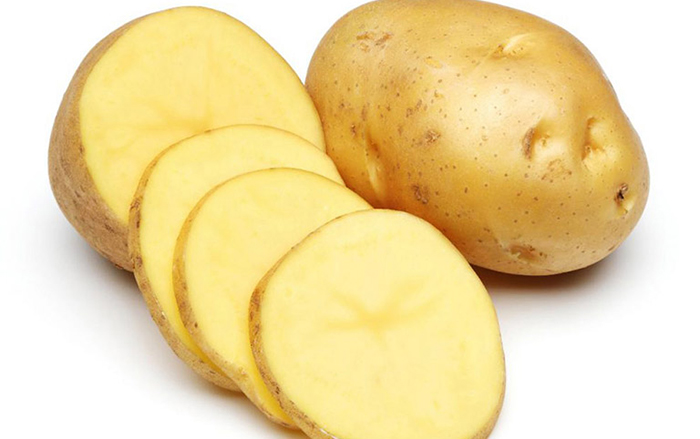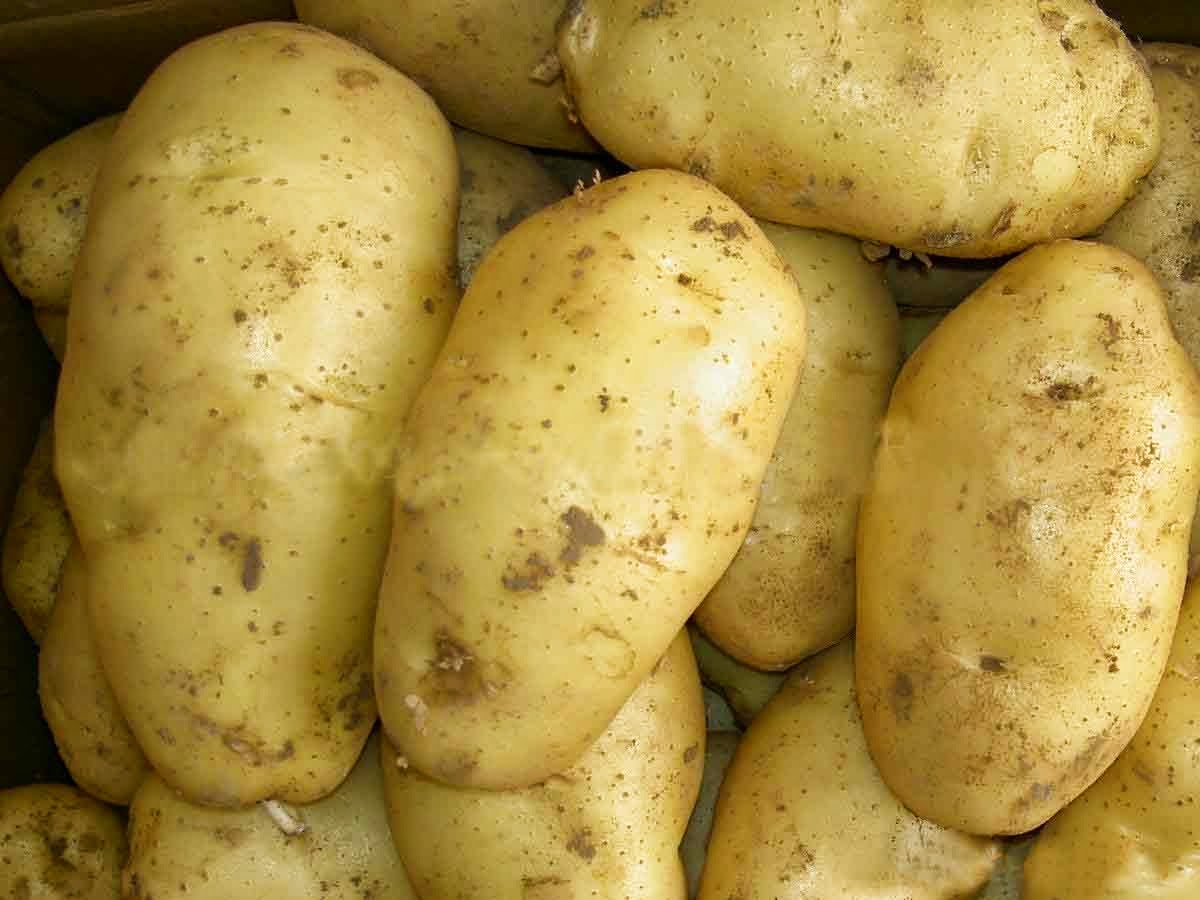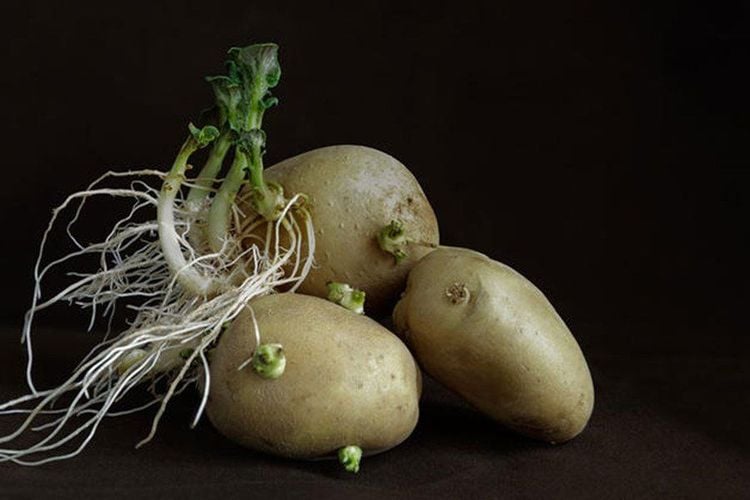Potatoes are a food source that contains many vitamins and minerals, which can bring many health benefits such as anti-inflammatory, pain relief, immune system enhancement, etc. In addition, potatoes are also a food with beauty benefits.
1. Nutritional composition of potatoes
Potatoes are a healthy food, however, the benefits that potatoes bring to the diet depend on: how they are prepared, how they are combined with other foods or how they are preserved…. Whole potatoes are a relatively low-calorie food. In addition, they also provide important nutrients, such as vitamin C, vitamin B6 and minerals.
A serving of 100 grams of potatoes will have the following nutritional composition: 94 calories; 0.15 grams of fat; 0 grams of cholesterol; 21.08 grams of carbohydrates; 2.1 grams of fiber; 2.10 grams of protein; 10 milligrams of calcium; 0.64 mg of iron; 27 mg magnesium; 75 mg phosphorus; 544 mg potassium; 12.6 mg vitamin C; 0.211 mg vitamin B6; 38 micrograms folate… In addition, potatoes also provide niacin, choline and zinc.
Raw potatoes contain very little sodium, only 10 mg per 100g. However, this is in contrast to processed potato products, such as French fries, which contain quite a lot of sodium.
Potatoes also contain a compound called alpha-lipoic acid (ALA), which helps the body convert glucose into energy. Some evidence suggests that alpha-lipoic acid may help control blood sugar, improve vasodilation, protect against retinopathy in diabetics, and preserve brain and nerve tissue.
Quercetin is a flavonoid found in potato skins that has anti-inflammatory and antioxidant properties, protecting the body’s cells from damage caused by free radicals. Potatoes contain vitamin C, which acts as an antioxidant. The role of antioxidants can help prevent cell damage and cancer, while promoting healthy digestion and cardiovascular function. The fiber in potatoes plays a role in maintaining a healthy digestive and circulatory system.

Potatoes contain large amounts of vitamin C and antioxidants.
2. What are the benefits of eating potatoes?
In fact, when potatoes are included in the diet, they can contribute to a healthy lifestyle, including preventing osteoporosis, maintaining heart health, and reducing the risk of infection. Here are some of the health benefits of potatoes:
2.1. Bone health
Minerals including iron, phosphorus, calcium, magnesium, and zinc in potatoes all help the body build and maintain bone structure and strength. Furthermore, iron and zinc play an important role in the production and maturation of collagen.
Phosphorus and calcium are both important in bone structure, but it is important to balance these two minerals for proper bone mineralization. Too much phosphorus and too little calcium leads to bone loss and contributes to osteoporosis.
2.2. Blood pressure
Low sodium intake is essential for maintaining healthy blood pressure, but increasing potassium intake is equally important. Potassium is a vasodilator, or the widening of blood vessels.
According to the National Health and Nutrition Examination Survey (NHANES), less than 2% of American adults meet the recommended 4,700 milligrams per day.
Additionally, potatoes are rich in minerals such as potassium, calcium, and magnesium. These minerals have all been shown to naturally lower blood pressure.
2.3. Heart Health
Potatoes are high in fiber, potassium, vitamin C , and vitamin B6 , and they lack cholesterol, all of which support heart health. Potatoes are a food that contains a significant amount of fiber. Fiber helps lower total blood cholesterol, thereby reducing the risk of heart disease. Research based on NHANES has found a link between high potassium and sodium intake and a reduced risk of death from heart disease.

Potatoes have a positive effect on heart health
2.4. Inflammation
Potatoes contain choline, an important and versatile nutrient. It helps with muscle movement, mood, learning, and memory. It also aids in:
- Maintaining the structure of cell membranes
- Transmitting nerve impulses
- Fat absorption
- Early brain development
The choline content in a large potato contains 57 mg. The daily requirement for adult men is 550 mg, and for women is 425 mg.
2.5. Cancer
Potatoes also contain folate. Because folate is involved in the synthesis and repair of DNA. Therefore, it will prevent many types of cancer cells from forming due to mutations in DNA.
The amount of fiber from vegetables, including potatoes, is also associated with a reduced risk of colorectal cancer.
2.6. Digestion
The fiber content in potatoes helps prevent constipation and promotes regularity for a healthy digestive tract.
2.7. Weight Management and Feeling Full
Fiber is often recognized as an important factor in weight management and weight loss. It acts as a bulking agent within the digestive system. By doing this, it increases the feeling of fullness and reduces the feeling of hunger. Therefore, when using potatoes, you will feel fuller for longer and less likely to consume more calories.
2.8. Metabolism
Potatoes are an excellent source of vitamin B6. This vitamin plays an important role in energy metabolism, by breaking down carbohydrates and proteins into glucose and amino acids. These are simple compounds that can be easily used to create energy for the body.
2.9. Skin
Collagen is the skin’s support system. And potatoes are quite high in vitamin C. This helps protect the skin because vitamin C acts as an antioxidant that helps prevent damage from the sun, pollution, and cigarette smoke. Furthermore, vitamin C also helps collagen smooth out wrinkles and improve overall skin texture.
2.10. Immunity
Some studies have found that vitamin C can help reduce the severity and duration of colds. Potatoes are a good source of vitamin C.
3. Some risks when using potatoes
Potatoes, along with tomatoes and eggplants, are part of the ornamental family. Some of these plants often contain some toxins that affect health. Potatoes were previously considered inedible. Because, potato shoots and leaves contain toxins such as:
- Solanine: Potatoes that have sprouted or turned green are likely to contain solanine. This compound has been found to cause circulatory and respiratory problems, as well as headaches, muscle cramps and diarrhea. If a potato has definitely sprouted or has formed “eyes”, then removing all the sprouts is enough. However, if the potato is shriveled or has a green skin, it should not be eaten.

Sprouted potatoes contain Solanin which affects the health of users.
- Acrylamide: Studies have shown that when potatoes are cooked above 120 degrees Celsius, a chemical called acrylamide is created. This compound is found in plastics, glues, dyes, and cigarette smoke. Acrylamide has been linked to the development of certain cancers. It also has neurotoxic properties and can have negative effects on genes and reproductive health.





